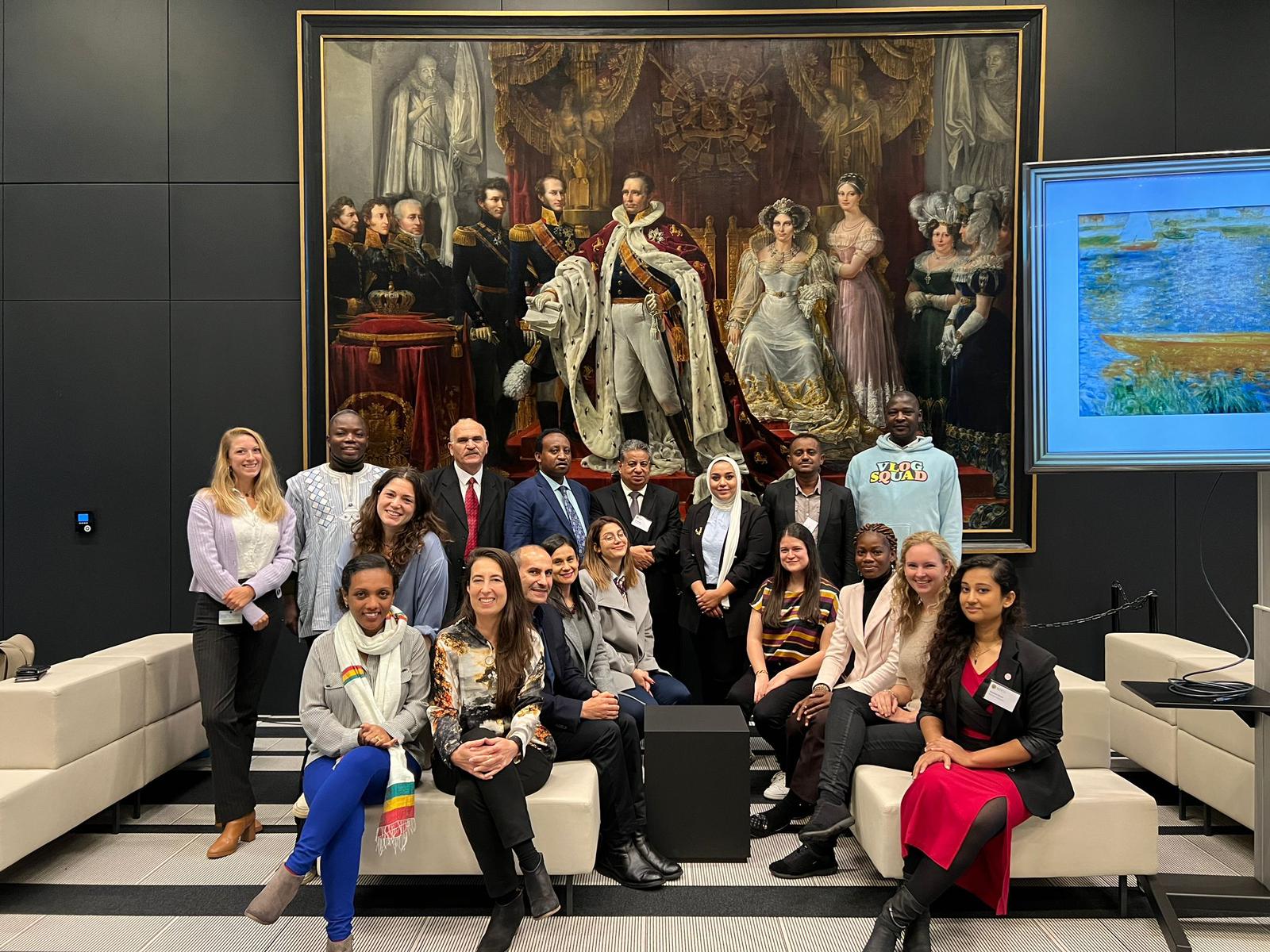Be Bold, Be Fair, and Context-sensitive: SNI ABM 2022
Image: Share-Net Coordinators and Secretariat at the Dutch Ministry of Foreign Affairs, October 2022.
Reflection on the Share-Net International Annual Business Meeting of 2022 by SNI Trainee Nora Naumann
The annual Business Meeting (ABM) of Share-Net International (SNI) took place in the heart of Amsterdam in October 2022. We organised the ABM as a hybrid version, with people attending in person and online. The afternoon was exciting, with engaging facilitators and a fantastic overview of how SNI works and what country hubs focus on locally. I joined SNI recently and am excited about my opportunity to learn in this multidisciplinary environment during a 6-month traineeship.
Within my first three weeks at Share-Net International, I became part of an energetic group and had the chance to meet the secretariats of five country hubs, and I deep-dived into one of SNI’s core projects – SHIRIM. SHIRIM is an 18-month active learning programme to enhance system thinking and develop knowledge products. It is a place for the hubs to explore, experiment, and exchange with their members to create meaningful knowledge products. The hubs develop new and effective strategies jointly and use these to disseminate Sexual and Reproductive Health and Rights (SRHR) Information and Education. The overall aim is to influence policy progressively and improve practice.
For me, the ABM was the chance to better understand the overall framework of SNI’s work and vision. When we look at the stakeholder landscape today, many organisations are dedicating their work towards SRHR, but none act primarily as a knowledge broker. This attribute makes SNI unique as it focuses on facilitating knowledge translation into policy & practice through equitable dialogue and partnerships. Knowledge management is vital in times when organisations see themselves confronted with growing opposition and a global trend of conservative backlash that threatens the civic space in which we act.
SNI presented the first draft of the 5-year Strategic Plan 2023-2027, focusing on Rights First and looking through an intersectional feminist lens. During the ABM, the audience could ask questions and give input via a strategic review. The audience feedback to the Strategic Plan 2023-2027 was mainly positive, with a few attendees criticising the lack of innovation and boldness. Does the updated 5-year Strategic Plan 2023-2027 pay attention to new possibilities? Hence is it innovative?
It is crucial to be open and discern opportunities wherever they appear. But to me, it is more a question of how we strategically scout for these opportunities and weave our networks. What I learned, is that innovation is all around us and does not mean reinventing the wheel. It is looking for mechanisms that work in a different context and adapting them to the needs of an organisation. Sometimes it means taking risks, but moreover, it means leaving our silos and moving towards system thinking. Share-Net International does this and is privileged as the field of knowledge brokering in SRHR is a blue ocean to explore. One area that might need to be more innovative to become sustainable is the funding model of Share-Net International, as it is highly dependent on donors. The Strategic Plan 2023-2027 was closely informed by the mid-term review, which was a participatory process with SNI members. Therefore we must assume that the strategic plan encompasses the values and vision of a representative group of SNI members.
In an international network, it is likely that boldness is not the highest priority. The ABM showed that SNI members dedicate their work to moving forward, but they also face significant threats. Attendees named opposition, culture, and religion as the biggest ones. Everyone working in SRHR might see this as evident and apparent, but for SNI, it could be critical to work together to face the opposition more strategically. If this is not possible, how can SNI develop a joint Theory of Change? How can we support each other in moving forward progressively? How can we encompass intersectional feminism and human rights perspective into the work plan if, in some contexts, progressive ideas are blighted the moment they appear to be? Contextualising SRHR work is critical for meaningful interventions. But how can we ensure that contextualisation does not meagre the universality of human rights?
These questions came to mind during the meeting and after post-processing my notes. One clear answer came from Dorine, the SNI coordinator:
“Sometimes, especially in cases like Jordan and Ethiopia, it can be vital to focus on what is possible within a country’s legal framework rather than being bold. – But we, as Share-Net International, need to trust that we are allies and are open to moving towards a progressive SRHR agenda and can also support those with more progressive values. Share-Net International is dedicated to transformational change with the final goal of allowing everyone to enjoy their sexual and reproductive health and rights freely.”
The final version of the 5-year Strategic Plan still needs to be finished, and the Theory of Change needs to be updated. This point may be an opportunity to create momentum to put rights first. Applying a human rights based perspective combined with intersectionality to manage SRHR knowledge is a bold strategy. The question remains if all country hubs can commit their work to these values jointly and if a proactive rather than a reactive strategy can be developed.
